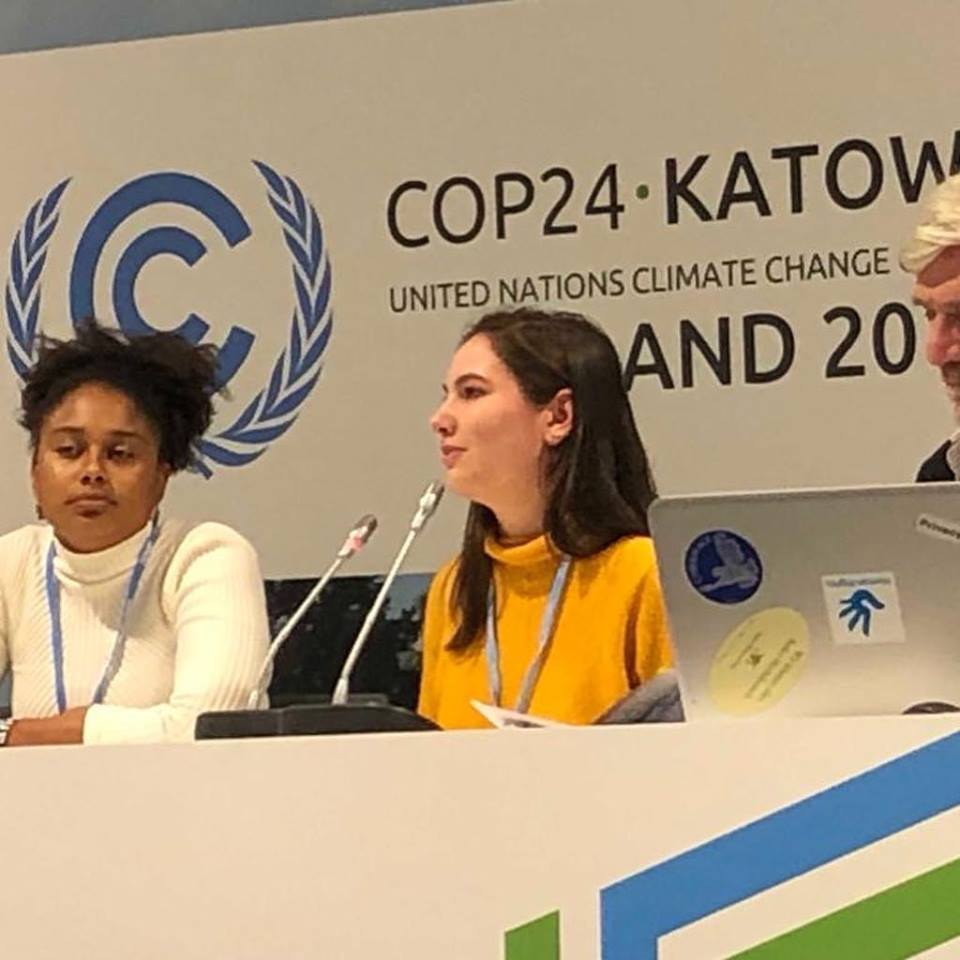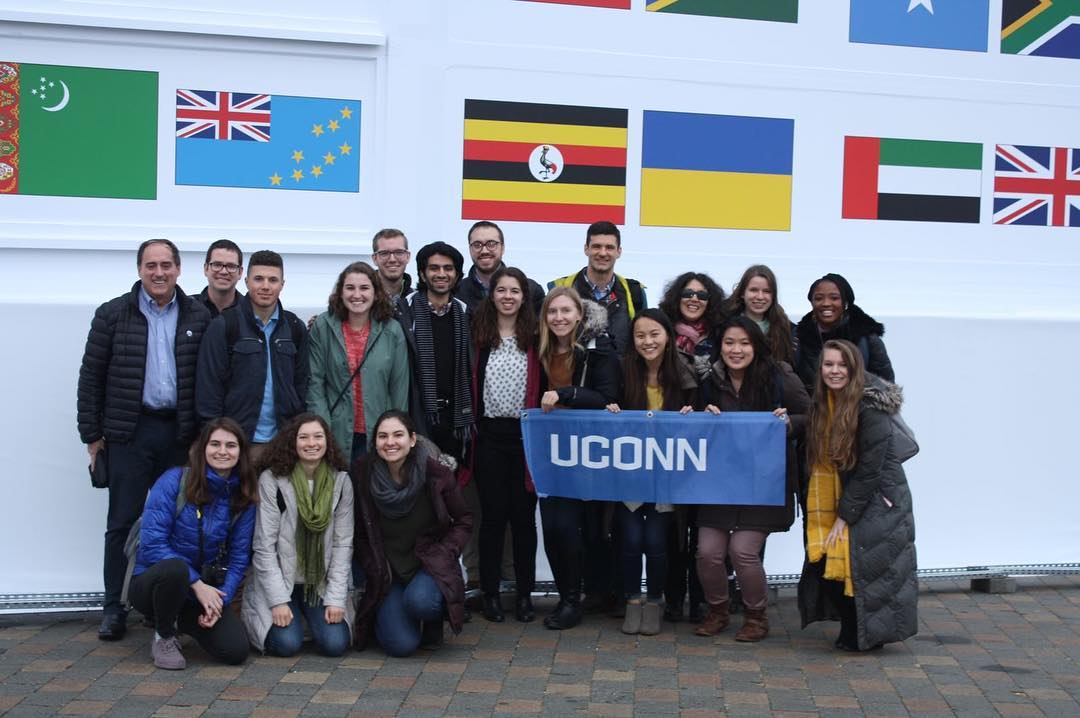
For the past two weeks, 15 UConn students and six faculty and staff members attended the United Nations Conference of Parties (COP) 24th Climate Change Summit. UConn has sent students and faculty to the climate change summits since 2015. This year’s summit, COP24, was held in Katowice, Poland, Dec. 2-14, with delegates from around the world convening to continue negotiations regarding climate change.
Read more about UConn’s representatives in action through the UConn Office of Environmental Policy’s Facebook page, Twitter account, Instagram account, or by foll0wing the #UConnTalksClimate hashtag.
The following are excerpts from blog posts by some of the student participants:
Brazil’s New President Putting Climate & Amazon Rain Forest at Risk
By Charlotte Rhodes, Junior, Environmental Studies
Walking into COP24, I was immediately struck by the Brazil Pavilion. Decorated with bright colors and large displays, the pavilion is a demonstration of the immense biodiversity and vital ecosystems housed in the region. But after my initial excitement set in, I was reminded that the Brazilian President, Jair Bolsonaro, has decided to take all of this away from the world.
Bolsonaro has rebuffed climate change, and promised during his campaign to rollback protections on the Amazon rain forest for economic gain. This plan is toxic, and because of the significant influence the Amazon has over the environment, will have a rippling effect throughout the environmental community.
The Amazon rain forest is a significant carbon sink and one of our most valuable resources against climate change. It can sequester millions of tons of carbon, successfully removing the greenhouse gas from the atmosphere. This is such an important resource and if Bolsonaro goes through with his plans for clear-cutting the Amazon, more action will be required by everyone else to meet the 1.5 degree goal. …
Are we changing? Yes. Can we change? Can we listen?
By Risa Lewis, Junior, Applied and Resource Economics
Heading to the COP24, I was hoping to find new ideas and insights within the field of environmental economics and policy, but I realize now I had subconsciously put my expectations for those new ideas within the familiar frameworks of thought and governance I was comfortable with. As a result, the most meaningful parts of my experience at the UN’s Climate Summit in Poland have been interactions and conversations with people with rather different perspectives from my own.
During a Climate Hub workshop entitled, “Women for Climate Justice: Local Struggles, Global Actions,” we were led through a meditative contemplation and drawing of the “territory of our bodies.” To invoke contemplation, the facilitator asked us how and where we felt the impacts of climate change and its potential solutions, including poverty, water scarcity, renewable energy, collective action, and ‘extractivism’ (the first time I had encountered the term).
As an example, the leader of our guided contemplation shared “market solutions” as something that greatly troubles her. Market solutions make up a significant portion of what I have been studying thus far (with a large exception perhaps being independent study of behavioral economics). Naturally, her statement prompted me to take a renewed look at the conflicting ideologies about the best ways to combat climate change. This is a conflict I have examined more closely this semester through the juxtapositions of my resource economics classes and an English class on the history and human experience of capitalism. …
I found that the “territory of our bodies” workshop proved the most productive in inspiring conversation and sharing by providing a common ground of others’ often similar interpretations of the personal impacts of climate change. Just as behavioral economics works to better represent the often-flawed nature of humanity, sharing personal stories from a starting point of some common perspective appears to be a vital part of the shift towards actively reducing the effects of climate change.
The Talanoa Dialogue is Making People Care!
By Katarina Konon, Junior, Chemical Engineering
Most people, especially in light of the most recent IPCC report, know something about climate change. Some people focus on the science behind it, others focus on the consequences, and still others decide to ignore it altogether. It can be hard to process all the warnings, statistics, and charts that we learn about in school or see on the news. Because of this, Fiji introduced the Talanoa dialogue at COP23, which aims to give people a platform to “share stories, build empathy, and to make wise decisions for the collective good.” This concept carried over into COP24.
I attended many different talks covering topics such as policy, renewable energy, plant-based diets, and youth action, but the ones I continue to think about the most were people from around the world simply sharing their stories. One speaker from New Zealand talked about how each year, summers in her community are magical. There’s fresh fruit, beautiful weather, and an overall lightheartedness. However, in recent years, summertime has also brought overtones of anxiety and fear as wildfires, a product of extreme record-breaking drought, grow more and more destructive. If that isn’t bad enough, her low-lying community’s land will be underwater by the end of her lifetime. As she talked, she emanated sadness and frustration, but her drive to prevent others from having the same fate spoke the loudest. She called for climate justice and climate equity, phrases I heard over and over at the conference. Together, these ideas convey that global warming is an ethical and political issue, and it generally poses the greatest threat to those who are the least responsible. Therefore, developed countries need to provide aid to those in less developed countries, who are disproportionately impacted by climate change.
Another speaker from China talked about how 10 years ago, when she was a child, she could see the stars. Now, she looks up and they’re not there because of pollution. If you can’t imagine wildfires or floods destroying your home, try to imagine this. It just makes me feel so sad.
There are a ton of reasons to care about climate change. So many, in fact, that it can be overwhelming. So start here. Start with the people who have to face it every day. Show some empathy, and do your part to reduce greenhouse gas emissions. You’d hate to be in their shoes someday.
The Emotional, Psychological, and Mental Impacts of Climate Change
By Leann Mclaren, Senior, Political Science and History
During my time as a member of the UConn@COP24 cohort attending the United Nations’ Conference on Climate Change in Poland, I had the opportunity to participate in an event titled “Intergenerational Inquiry: Youth Stepping Up for Climate Action.” The event showcased multiple speakers, from the UN Secretary General for Youth to delegates from Ghana and students from many different countries.
What I found especially provoking was the testimony from a youth activist from the island of Jamaica. He described his struggle of being exiled from his community as a kid due to his LGBTQ identity. From his story of homelessness, he described how the impacts of climate change took an emotional toll on him in addition to his family problems. In Jamaica, he described how as a developing island nation, many of the national disasters have the ability to wipe out entire nations of people. The harsh effects of climate change disproportionately affect people who were not primary contributors of greenhouse gas emissions.
Similarly, with another student from India, he described how his motivation to become an activist for climate justice stemmed from his childhood. Memories of morning runs with his father in India became progressively dangerous, as temperatures increased to over 125 degrees Fahrenheit. The harsh effects of climate change affected not only his health but also his emotional connections with his father. He explains how these changes impacted his psychological development and contributed towards his activism.
Overall, the students and speakers in this event resonated with me. The narrative of their personal stories allowed me to see how climate change produced much more than physical effects, but negative emotional and mental health side effects as well. This event made me more aware of the totality of impacts caused by climate change and more motivated to take action as a result of these realizations. I now aim to reduce my personal emissions and raise awareness to promote behavioral change among others, not only for the sake of preventing the catastrophic increase in global temperatures, but also for the mental, emotional, and psychological well-being of others all over the world.
… While the Paris Climate Agreement was a historical step for humankind, it’s not nearly enough to save us. The agreement was the beginning of this world transformation; true change will require continued, tenacious, collaborative effort.
… Even if we do not reach our goal of 1.5℃, or even that of 2℃, any change we make now will still have an important effect on generations to come. So get out there and make some change happen. Reduce your carbon footprint. Vote … Start improving your community. Collaborate with friends and neighbors. Have meaningful conversations with those around you. We are each just one person, but we still have an important, irreplaceable influence on the world around us.
Read the blog posts in full at: https://ecohusky.uconn.edu/blog/
Read the IPCC’s Report at: http://www.ipcc.ch/report/sr15/



